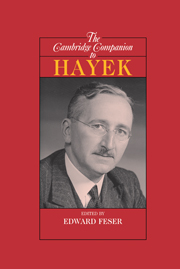Book contents
- Frontmatter
- Introduction
- 1 Hayek and the Austrian tradition
- 2 Hayek on money and the business cycle
- 3 Hayek and market socialism
- 4 Hayek and Marx
- 5 Hayek versus Keynes: the road to reconciliation
- 6 Hayek on knowledge, economics, and society
- 7 Hayek and Popper: the road to serfdom and the open society
- 8 Hayek’s politics
- 9 Hayek the philosopher of law
- 10 Hayek and liberalism
- 11 Hayek and conservatism
- 12 Hayek on the evolution of society and mind
- 13 Hayek on justice and the order of actions
- 14 Hayek the cognitive scientist and philosopher of mind
- Guide to Further reading
- Bibliography
- Index
3 - Hayek and market socialism
Published online by Cambridge University Press: 28 January 2007
- Frontmatter
- Introduction
- 1 Hayek and the Austrian tradition
- 2 Hayek on money and the business cycle
- 3 Hayek and market socialism
- 4 Hayek and Marx
- 5 Hayek versus Keynes: the road to reconciliation
- 6 Hayek on knowledge, economics, and society
- 7 Hayek and Popper: the road to serfdom and the open society
- 8 Hayek’s politics
- 9 Hayek the philosopher of law
- 10 Hayek and liberalism
- 11 Hayek and conservatism
- 12 Hayek on the evolution of society and mind
- 13 Hayek on justice and the order of actions
- 14 Hayek the cognitive scientist and philosopher of mind
- Guide to Further reading
- Bibliography
- Index
Summary
F. A. Hayek is perhaps best known for his opposition to socialism. His most famous work is undoubtedly The Road to Serfdom ([1944] 1962) and the last work he published, The Fatal Conceit (1988), was actually conceived of in the context of attempting to arrange a worldwide debate between advocates of socialism and advocates of capitalism. His founding of the Mont Pèlerin Society in 1947 was an attempt to align the opponents of socialism in the intellectual, political, and business worlds so they could form an effective intellectual bulwark against the rising tide of socialism in the democratic west. He directed his argument against the “hot” socialism of Marxism as well as the “cold” socialism of the social democratic welfare state in the post-Second World War era.
The fact that Hayek was a critic of government command and control over the economy is well known among scholars and intellectuals. Socialism lacked incentives and presented the central planning authority with too complicated a task. As a result socialism was too bureaucratic and cumbersome to operate in an economically efficient manner. Moreover, it is also known that Hayek postulated that the very worst elements within government will tend to take advantage of the situation to rise to power, and thus not only would socialism suffer from a “knowledge problem” but also from an “abuse of power problem.”
- Type
- Chapter
- Information
- The Cambridge Companion to Hayek , pp. 51 - 66Publisher: Cambridge University PressPrint publication year: 2006
- 7
- Cited by

